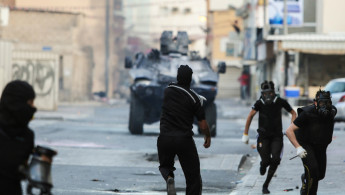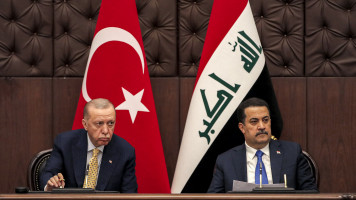'Terrorist cell' aggravates already sour Bahrain-Iran relations
The cell comprised 47 members, and was backed by Iran, say authorities, in a development that has further aggravated historically sour relations between the two countries.
The Bahraini Interior Ministry said interrogations of those arrested on 30 September exposed a cache of explosives hidden underground, below a house, and another site nearby that was being used as a workshop to manufacture homemade bombs in a populated area of Nuwaidrat village.
The ministry linked the cell to "terrorist elements" present in Iraq and Iran.
Bahrain withdrew its ambassador to Iran, Rashid Saad al-Dosari, on October 1, and declared Iranian Charge D'affaires in Bahrain, Mohammad Reza Babaei, persona non grata, giving him 72 hours to leave the country.
| Souring relations |
|
The relationship between Bahrain and Iran has been unstable since well before the island's independence from Britain in 1971. At the time, Iran's Shah Mohammad Reza Pahlavi called for the annexation of Bahrain as the 14th Iranian province. |
The statement by the Bahraini Foreign Ministry said that its decision came as a result of the "continued Iranian intervention in Bahraini affairs", and its "attempts to create sectarian strife, and impose its hegemony and control over the whole region".
"The threat posed by Iran in the region is no different to the threat by [the Islamic State group]," said Bahrain's foreign minister, Sheikh Khaled ben Ahmed al-Khalifa, at the end of October.
"Iran has been training and funding terrorists in Bahrain and exploiting a number of citizens and training them on manufacturing explosives and smuggling arms."
On Wednesday, officials said the latest suspects "possessed and manufactured explosives and arms" in remote parts of the country.
"Investigations indicate the group is closely linked to Iranian entities and terrorist elements based in Iran," Bahrain's interior ministry said, while giving no further details.
"Many members received training in Iranian camps on using weapons and making explosives."
No Iranian statement has yet been issued regarding these accusations. However, Iranian news outlets, pre-empting any such statements, ran with denouncements of the arrests made in Bahrain.
Iranian news agencies IRNA and FARS described the crackdown as a "campaign of arbitrary detentions against Bahraini citizens".
Meanwhile, five Bahrainis were convicted of conspiring with Iran to carry out attacks inside Bahrain, sentenced to life imprisonment and stripped of their citizenship, Bahrain's Public Prosecutor was cited as saying by state news agency BNA.
Two of the five were accused of receiving training in Iran on explosives and munitions, while the others were accused of incitement and providing assistance to carry out "subversive acts".
The two were tried in Bahrain while the rest were sentenced in absentia on Thursday.



